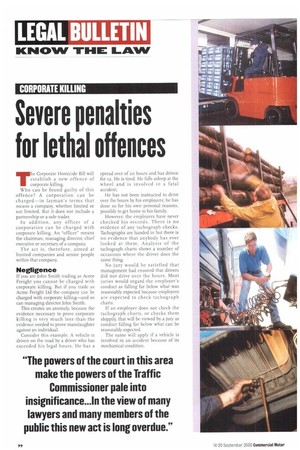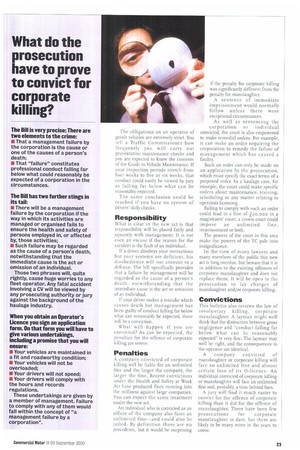Severe penalties for lethal offences
Page 24

Page 25

If you've noticed an error in this article please click here to report it so we can fix it.
The Corporate Homicide Bill will establish a new offence of corporate killing. Who can be found guilty of this offence? A corporation can be charged—in layman's terms that means a company, whether limited or not limited. But it does not include a partnership or a sole trader.
In addition, any officer of a corporation can be charged with corporate killing. An "officer" means the chairman, managing director, chief executive or secretary of a company.
The act is, therefore, aimed at limited companies and senior people within that company.
Negligence
If you are John Smith trading as Acme Freight you cannot be charged with corporate killing. But if you trade as Acme Freight Ltd the company can be charged with corporate killing—and so can managing director John Smith.
This creates an anomaly, because the evidence necessary to prove corporate killing is very much less than the evidence needed to prove manslaughter against an individual.
Consider this example. A vehicle is driven on the road by a driver who has exceeded his legal hours. He has a spread over of zo hours and has driven for 12. He is tired. He falls asleep at the wheel and is involved in a fatal accident.
He has not been instructed to drive over the hours by his employers; he has done so for his own personal reasons, possibly to get home to his family.
However, the employers have never checked his records. There is no evidence of any tachograph checks Tachographs are handed in but there is no evidence that anybody has ever looked at them. Analysis of the tachograph charts shows a number of occasions where the driver does the same thing.
No jury would be satisfied that management had ensured that drivers did not drive over the hours. Most juries would regard the employer's conduct as falling far below what was reasonably expected because employers are expected to check tachograph charts.
If an employer does not check the tachograph charts, or checks their sloppily, that will be viewed by a jury as conduct falling far below what can be reasonably expected.
The same will apply if a vehicle is involved in an accident because of its mechanical condition. flie obligations on an operator of goods vehicles are extremely strict. You tell a Traffic Commissioner how frequently you will carry out preventative maintenance checks and you are expected to know the contents of the Guide to Vehicle Maintenance. If your inspection periods stretch from four weeks to five or six weeks, that conduct could easily be viewed by jury as falling far below what can be reasonably expected.
The same conclusion could be reached if you have no system of drivers' daily checks.
Responsibility
What is clear in the new act is that responsibility will be placed fairly and squarely with management. It is not even an excuse if the reason for the accident is the fault of an individual.
If a driver disobeys your instructions but your systems are deficient, his disobedience will not amount to a defence. The bill specifically provides that a failure by management will be regarded as the cause of a person's death, notwithstanding that the immediate cause is the act or omission of an individual.
if your driver makes a mistake which causes death but management has been guilty of conduct falling far below what can reasonably be expected, there will be a conviction.
What will happen if you are convicted? As can be expected, the penalties for the offence of corporate killing are severe.
Penalties
A company convicted of corporate killing will be liable for an unlimited fine and the larger the company, the larger the fine. Recent convictions under the Health and Safety at Work Act have produced fines running into the millions against large companies. You can expect the sarne treatment under the new act.
An individual who is convicted as an officer of the company also faces an unlimited fine—and could also be jailed. By definition there are no precedents, but it would be surprising iF the penalty for corporate killing was significantly different from the penalty for manslaughter.
A sentence of immediate imprisonment would normally follow unless there were exceptional circumstances.
As well as sentencing the corporation or individual convicted, the court is also empowered to make remedial orders. For example, it can make an order requiring the corporation to remedy the failure of management which has caused a fatality.
Such an order can only be made on an application by the prosecution, which must specify the exact terms of a proposed order. In a haulage case, for example, the court could make specific orders about maintenance, training, scheduling or any matter relating to operators licensing.
Failing to comply with such an order could lead to a fine of 120.000 in a magistrates' court; a crown court could impose an unlimited fine, imprisonment or both.
The powers of the court in this area make the powers of the TC pale into insignificance.
In the view of many lawyers and many members of the public this new act is long overdue, but beware that it is in addition to the existing offences of corporate manslaughter and does not replace them. It will be open in the prosecution to lay charges of manslaughter and/or corporate killing.
Convictions
This bulletin also reviews the law of involuntary killing, corporate manslaughter. A layman might well think that the distinction between gross negligence and "conduct falling far below what can be reasonably expected" is very fine. The layman may well be right, and the consequences to the operator are identical.
A company convicted of manslaughter or corporate killing will face an unlimited fine and almost certain loss of its 0-licence. An individual convicted of corporate killing or manslaughter will face an unlimited fine and, probably, a time behind bars.
A jury will find it much easier to convict for the offence of corporate killing than it did for the offence of manslaughter. There have been few prosecutions for corporate manslaughter to date, but there are likely to be many more in the years to come.








































































































